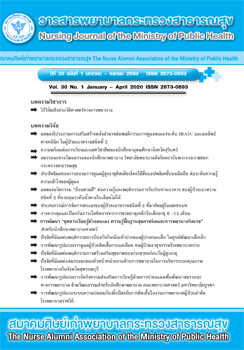Effectiveness of Educational Training via Mobile Application on Caregivers’ Understanding regarding Bedridden Elderly Care
Main Article Content
Abstract
Providing educational training for caregivers of bedridden elderly care through mobile application is an effective strategy to enhance caregivers’ competence, especially those who live in metropolitan areas. This quasi-experimental research study aimed to investigate the effectiveness of educational training via mobile application regarding bedridden elderly care. The participants consisted of 30 caregivers, living in the area under the jurisdiction of 5 district health promoting hospitals. The research instrument included an educational training program through mobile application for the care of the bedridden elderly. It consisted of 8 topics, and was disseminated to participants, 2 topics per week, and lasting for 4 weeks. The data collection instruments were questionnaires evaluating participants’ understanding of bedridden elderly care, and satisfaction with the educational training program. Both reported reliability of .73 and .87, respectively. Data were analyzed using descriptive statistics and t-test comparisons. The finding revealed that, after participation in the education training program, the mean score of caregivers’ understanding of bedridden elderly care and the number of participants who reached the targeted score, were higher than those before participation (p<.01). The participants also reported high level of attitude towards the training program, in terms of both the method and contents (mean=4.28-4.43, SD=.54-.62). The findings show the effectiveness of educational training through mobile application. Healthcare staff should use this strategy to provide health education to caregivers in other groups because it can save time and cost. Caregivers can review the contents conveniently for further understanding.
Article Details
บทความและรายงานวิจัยในวารสารพยาบาลกระทรวงสาธารณสุข เป็นความคิดเห็นของ ผู้เขียน มิใช่ของคณะผู้จัดทำ และมิใช่ความรับผิดชอบของสมาคมศิษย์เก่าพยาบาลกระทรวงสาธารณสุข ซึ่งสามารถนำไปอ้างอิงได้
References
2. Anuruang S, Multimorbidity in older persons: situation, challenge issues, and care management. Journal of Nursing Science Chulalongkorn University 2017;29(2):1-14. (in Thai).
3. Chongkhosuntisuk K. Community capacity building in bed ridden patient, Amphoe Ngao, Lampang. Journal of Health Sciences Scholarship 2017;4(1):42-56.(in Thai).
4. Mangmee J. Effects of health care for institutional care by participation of care giver, Na Yae district, Ubon Ratchathani Province. UBRU Journal of Public Health Research. 2019. 8(1): p. 86-96. (in Thai).
5. Jarujit S, Aramsin R, Prachano W. Home visit model for bedridden patients based on the problems and needs of caregivers. Journal of Phrapokklao Nursing College 2019;30(1):54-68.(in Thai).
6. Phuaksawat P, Nakkhun N, Rotchanarak W. Situations, problems, and health care needs for home-based and bed-bound chronically ill patients in Surathhani municipal community. Nursing Journal of the Ministry of Public Health 2016;26(2) :54-64. (in Thai).
7. Boonvas K, Supnunt T, Chunhabordee A, Wae N. Caregiver stress and needs in caring diabled. The Southern College Network Journal of Nursing and Public Health 2017;4(1):205-17.(in Thai).
8. Plachaipiromsilp S. Usages trend of mobile application. Executive Journal 2011;31(4):110-5.(in Thai).
9. Payuha N, Homrod P, Jareanthunyasakul T. Youtube viewing behaviors of the people aged between 40-60 years old, Nakhon Sri Thammarat. Walailak Procedia 2019. 2019;(8):1-9. (in Thai).
10. Chuenhiran S,Vicheanpanya J. The development of traning media for developing machine control knowledge for assembly2’s operators of production department DDK (Thailand) Ltd. Information Technology Journal 2015;11(2):7-16. (in Thai).

